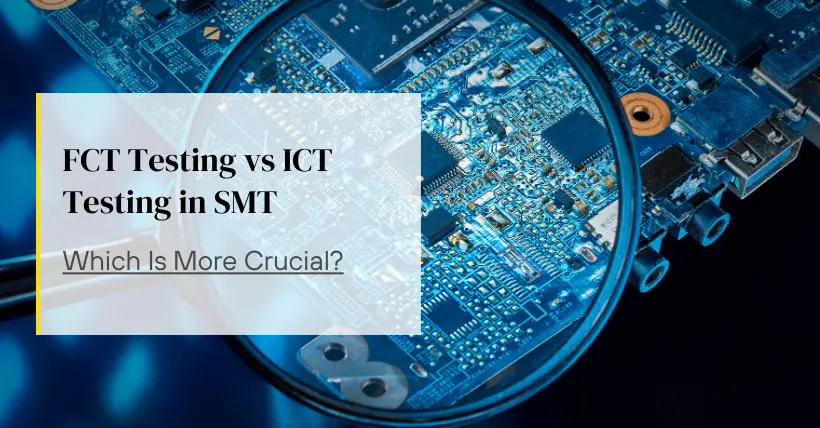In the SMT industry, ensuring product quality and performance is crucial. Among them, FCT (Functional Test) and ICT (In-Circuit Test) are important components of PCBA (Printed Circuit Board Assembly) testing, each playing a key role. Although both aim to ensure product quality, there are clear differences in their testing methods, purposes, and application scenarios. So, when comparing FCT and ICT tests, which one is more important?
01
ICT Test: Key Detection of Circuit Connectivity and Component Values
ICT is a static test, primarily conducted without power. It uses a bed-of-nails method for physical contact testing, focusing on checking the electrical properties of electronic components (including passive and active components) and connections on the printed circuit board. This includes parameters like open circuits, short circuits, resistance, capacitance, inductance, diodes, and transistors. The main purpose of ICT is to quickly detect defects in production, improving efficiency and reducing costs. It can promptly identify and fix problems that may arise during component placement or soldering, ensuring that each electronic component is properly connected, component values are accurate, and the overall circuit functions correctly.
02
FCT Test: Comprehensive Verification of Functionality and Performance
FCT is a dynamic test that requires power. It simulates external conditions and input signals to test the functionality of the circuit board, ensuring it operates as designed. FCT focuses on the final functionality of the product, such as whether buttons respond, sensors are accurate, and communication is normal. By simulating the real operating state of the PCBA board, FCT can capture parameters under various conditions, verifying the quality of the product’s functionality. FCT is typically arranged at the final stage of the production line, ensuring that products coming off the line meet end-user requirements, enhancing product reliability and stability.
03
Comparison of FCT and ICT Tests
- Test Purpose: ICT focuses on detecting circuit connectivity and component values, while FCT emphasizes verifying the product’s functionality and overall performance.
- Test Stage: ICT is usually conducted in the early stage of the production line, while FCT is typically arranged at the final stage.
- Test Method: ICT is a static test, FCT is a dynamic test.
- Test Content: ICT primarily checks whether the electrical connections between components on the circuit board are correct, while FCT simulates a real operating state to test various functional parameters of the product.
04
Which Test is More Important?
In the SMT industry, FCT and ICT have their own importance and application scenarios, making it difficult to simply determine which is more crucial. ICT, as a key step in quality control, ensures the correctness of electrical connections and component values, laying the foundation for the product’s basic functionality. FCT, on the other hand, further verifies the functionality and overall performance of the product, ensuring its reliability and stability in real-world applications.
Therefore, FCT and ICT are complementary, jointly ensuring the quality of circuit boards. In actual production, the choice and application of these two testing methods should be based on the specific requirements of the product and the arrangement of the testing process to achieve the best quality control effect.
Overall, FCT and ICT both play indispensable roles in the SMT industry, with their importance depending on the specific needs of the product and the testing process arrangement. In practical applications, the strengths and application scenarios of both should be considered to ensure the final quality and reliability of the product.

Disclaimer:
- This channel does not make any representations or warranties regarding the availability, accuracy, timeliness, effectiveness, or completeness of any information posted. It hereby disclaims any liability or consequences arising from the use of the information.
- This channel is non-commercial and non-profit. The re-posted content does not signify endorsement of its views or responsibility for its authenticity. It does not intend to constitute any other guidance. This channel is not liable for any inaccuracies or errors in the re-posted or published information, directly or indirectly.
- Some data, materials, text, images, etc., used in this channel are sourced from the internet, and all reposts are duly credited to their sources. If you discover any work that infringes on your intellectual property rights or personal legal interests, please contact us, and we will promptly modify or remove it.








